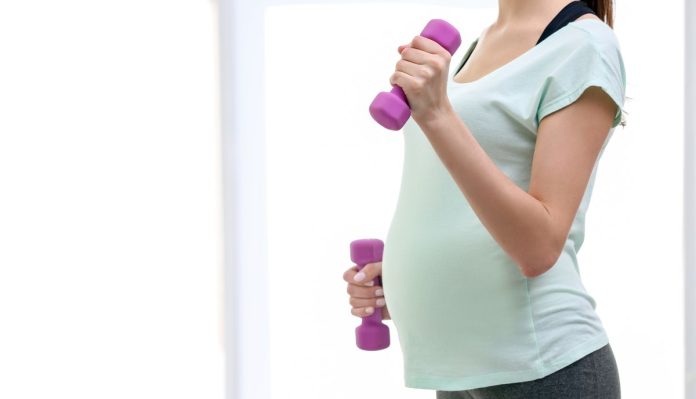Pre workout while pregnant? It’s not something that many people think of, and with good reason – it’s risky business if you’re not sure how your body will react to the ingredients inside. Don’t take chances when there are other, safer ways to stay in shape and burn off that pregnancy weight! Here, we tell you what you need to know about taking pre workout while pregnant and why it could be bad for your baby growing inside of you!
Are Pre-Workouts Safe During Pregnancy?
Pregnancy is a time of excitement, anticipation and preparation. However, the journey to parenthood can come with many concerns. One of these concerns is how to stay healthy during pregnancy. The question of whether it is safe to consume pre-workouts during pregnancy has been raised by many women in recent years. Pre-workouts are supplements that typically contain caffeine and other ingredients such as creatine or B vitamins that are designed to enhance energy levels before an intense workout session or event. These products have been marketed as being safe for use by both male and female athletes alike. Some of the benefits attributed to these supplements include increased endurance, better focus and improved moods. There does not seem to be any conclusive evidence indicating that taking pre-workouts leads to any negative effects for mothers or their unborn babies. It should also be noted that much of this research comes from animal studies where rats were given certain doses over the course of gestation periods; which means more research needs to be done in humans. If a woman decides to continue consuming pre-workout products while pregnant she may want to talk with her doctor first. Another important thing to consider is the amount of each ingredient used in the product because each ingredient will vary in its potential side effects. For example, caffeine consumption during pregnancy can lead to irritability, difficulty sleeping and vomiting.
What Ingredients Can Be Harmful to Your Baby?
One of the ingredients that can be harmful to your baby is caffeine. Too much caffeine can lead to a miscarriage, premature birth, and low birth weight. So it’s best to avoid pre-workout supplements with any type of stimulant in them. Other ingredients that can be harmful are those that increase blood pressure like tyrosine and those with high levels of nitrates like beta alanine and creatine. And, lastly, the heavy metals found in certain supplements like lead or mercury which can cause health problems for both mom and baby alike. So, before taking any pre-workout supplement during pregnancy make sure to consult your doctor first!
Also, once you start working out after giving birth remember to stay hydrated! Drinking plenty of water will help keep up production of breast milk as well as prevent dehydration. I know how hard it was for me to lose my baby fat after giving birth so don’t feel discouraged if you don’t see results right away. It took me several months after giving birth just to fit back into my pre-pregnancy clothes!
What can you take for energy while pregnant?
There are a few things that can help you get the energy you need to start your day. Some people may think they need to go straight for coffee or tea, but there are plenty of other options. You can try green tea, which is rich in antioxidants and has less caffeine than traditional black tea. You could also opt for a cup of chamomile tea or hot water with lemon, which have both been shown to be calming and soothing. If you do want to drink coffee or other caffeinated beverages, though, try to limit yourself to only one per day and consume it after 2pm in order to avoid sleeping problems later on at night. However, this does not mean that you should stop taking caffeine altogether! Energy drinks like Red Bull and Monster contain about 80mg of caffeine- about the same as a regular cup of coffee.
If you’re looking for an alternative to energy drinks or coffee, many people swear by kombucha (also known as kombucha tea), which contains about two times as much caffeine as most coffees or teas. It also has several vitamins and minerals including calcium and B vitamins. Kombucha also provides electrolytes like potassium, magnesium, zinc, and iron; all essential for maintaining muscle health during pregnancy–though be sure not to overdo it since these electrolytes can lead to high levels of sodium if consumed too frequently (which could harm fetal development).
Pre-Workout Alternatives For Pregnant Women
There are many alternatives to taking traditional pre-workout supplements while pregnant. The most important thing to do is to consult with your OBGYN before making any decisions, as they’ll be able to guide you in what’s safe and what’s not. Some alternatives include:
* Protein powder: protein powders can be used for a variety of things like a post-workout recovery drink or a meal replacement shake. There are also many different types of protein powders such as whey, casein, soy, pea, hemp, rice or vegan protein powders depending on your personal preferences.
* Coconut oil: coconut oil is good for energy and also tastes great! You can use it as part of a healthy diet by adding it to recipes or drinking it mixed in water. It also has anti-inflammatory properties which makes it an effective supplement if you’re experiencing pain during pregnancy.
* Probiotics: probiotics are helpful because they promote the growth of good bacteria and decrease the overgrowth of bad bacteria, both essential during pregnancy. These supplements help improve digestion which is often problematic when pregnant due to changes in hormones and certain foods being off limits during pregnancy like alcohol, coffee, spicy foods etc. Probiotics come in capsules that need to be taken three times daily along with food intake.
Conclusion
It is not recommended to use pre-workout supplements when pregnant because it can be dangerous for the baby. Exercise is important during pregnancy, but it’s best to talk with your doctor before starting any type of exercise regimen, especially if you are a new mom. Some women also find that they get more tired or sore as they get closer to giving birth, so working out might feel harder or less comfortable. If you’re feeling under the weather and have questions about how to work out safely while pregnant, speak with your doctor.

